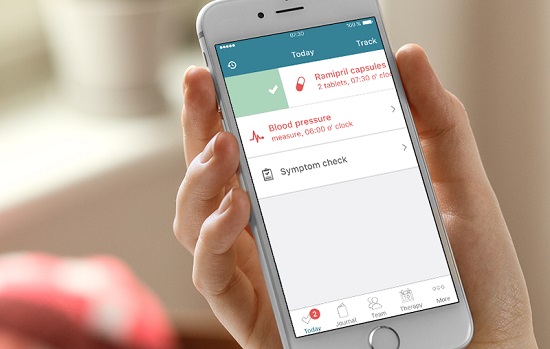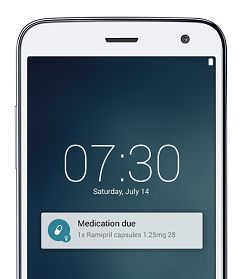Say Goodbye to Angina Pectoris Pain: Managing Your Treatment and Symptoms with the Help of a Health Tracker App
In Order to Manage Angina Pectoris, It Is Important to Take Medication. Smartphone Apps, like Mytherapy, Can Help Reduce Chest Pain, Prevent Further Attacks, and Encourage Patients to Live a Healthier Life

Angina pectoris is the medical term for chest pain or discomfort caused by coronary heart disease. Angina typically causes uncomfortable pressure in the chest, neck, jaw, shoulders, or back, fullness or a squeezing sensation in the center of the chest, increased sweating, and shortness of breath. These symptoms are often associated with a heart attack, so having angina pectoris can be a frightening experience. Angina pectoris is usually not life-threatening, but it is an indication that the heart is not functioning properly and that there is an increased risk of fatal heart attacks or strokes. If you have angina pectoris, it is therefore imperative that you take note of your symptoms, know what is typical for you, and learn to control the condition. Fortunately, there are various medications available that relieve the symptoms of angina and help reduce the risk of heart-related complications. Taking medication correctly can be difficult, especially if there are several different pills that must be taken at different times during the day. Smartphone medication reminder and health tracker apps, like MyTherapy, can therefore offer some added support for people living with angina pectoris.
If you have angina pectoris and need some help remembering to take your medication, then MyTherapy is the app for you. The app generates reminders (alarm and pop-up notifications) and comes with a built-in health diary that allows you to monitor your symptoms, triggers, and medication side effects. With the diary, you can also record important health measurements (like weight, blood pressure, and cholesterol levels) and set daily health goals in terms of exercise and diet. The medication reminder and health diary therefore help you manage your medication, prevent attacks, reduce risks of complications, and improve your overall health and sense of well-being. Importantly, all the data your record in the app can be printed out in the form of a health report that can be given to your doctor. He or she can then gain insight into how you are doing regarding symptoms and treatment and use it to adjust the treatment plan and recommend individual lifestyle changes if needs be.
The team at MyTherapy also takes user-feedback seriously. We aim to keep the app as user-friendly as possible and always take our users’ needs and recommendations into consideration. We also understand the importance of privacy and data protection. We conform to Germany’s strict privacy laws so you can rest assured that your data will always be protected.
Angina Pectoris: Predictability and Triggers
Angina is a type of chest pain that is caused by restricted blood flow to the heart. This usually happens because one or more of the heart’s arteries is narrowed or blocked. The pain is often described as dull, tight, or squeezing and the pain or pressure can be felt in the back, neck, jaw, shoulders, and arms. The onset of the pain is usually referred to as an angina attack and people may either suffer from stable or unstable angina.
As the name suggests, unstable angina attacks are unpredictable and can occur spontaneously. They are regarded as a medical emergency because they indicate that the heart is not functioning properly and there is an increased risk of an immediate heart attack or stroke.
Stable angina – known as angina pectoris – is the more common type of angina. If someone has stable angina, it means that the causes of the chest pain are known (for instance from exercise or stress) and patients can predict when it will happen. Angina pectoris can be managed by taking medication, resting, and identifying triggers. Although it is not life-threatening, it does mean that the heart is not functioning optimally and that there is an increased risk of having a heart attack or stroke. It is estimated that approximately 9.8 million Americans experience angina annually and there are at least 500,000 new cases each year.
Recognizing the Signs and Symptoms
The most obvious sign of a stable angina attack is a particular type of chest pain. It is often described as a pressure or fullness in the middle of the chest. As already mentioned, the pain may also spread to the neck, jaw, arms, shoulders, and back. Other symptoms of stable angina may include:
- Shortness of breath
- Nausea
- Tiredness
- Increased sweating
- Dizziness
If you experience any of these symptoms at any stage you should see a healthcare professional immediately. He or she will ask you about your medical history and do various tests. The tests often include an angiography, which is a type of x-ray that makes the blood vessels and blood flow to the heart visible, and an electrocardiogram (ECG). The ECG measures your heart’s rhythm and electrical activity and may be carried out while you are doing exercise to determine whether physical activity is a trigger of the condition. Tests like these allow your doctor to assess the functioning of your heart and whether any blood vessels are blocked.
Angina Attacks: Why Do They Happen?
Stable angina occurs when the heart muscle does not receive enough blood. Oxygenated (oxygen-rich) blood is supplied to the heart by the coronary arteries and certain factors, like the accumulation of fatty deposits, can cause these arteries to narrow and harden by a process known as atherosclerosis. When this happens, the heart becomes deprived of oxygen. Severely narrowed arteries may allow enough blood to reach the heart when the demand for oxygen is low. But during periods of exercise or stress, the heart works harder and requires more oxygen (and therefore more blood) and if the arteries are blocked, not enough oxygen reaches the heart and this is when an angina attack occurs.
There are various factors that can increase the risk of angina. They include:
- High blood pressure or high cholesterol levels
- Being overweight or obese
- Lack of exercise
- A high fat diet
- Smoking
- Diabetes
- Age
- A family history of angina
Angina is a common condition that mostly affects elderly people. In England, about one in every 12 men and one in every 30 women between the ages of 55 and 64 years have angina.
Your Heart Is a Muscle so Help Make It Stronger
Stable angina can be treated with a combination of lifestyle alterations, medication and – in some cases – surgery. The aim of treating angina is to relieve the pain, prevent attacks, and reduce the risk of heart attacks or stroke.
There are various types of medications that can help treat stable angina. For immediate pain relief, the most commonly used medication is glyceryl trinitrate (or nitroglycerin). This drug works by relaxing and widening the vessels that supply the heart with blood. One dose of glyceryl trinitrate usually relieves the symptoms of angina within two to three minutes.
To prevent angina attacks from happening again, other medicines are necessary. The type of medication that will work best for you depends on several factors, including medication side effects or if you have any other health conditions. Usually, beta-blockers or calcium channel blockers are prescribed to reduce the risk of angina. Beta-blockers decrease the heart rate, which decreases blood pressure. Calcium channel blockers allow the muscles in the walls of the arteries to relax, which in turn causes the blood vessels to widen. Other medications to reduce the frequency of angina attacks include ranolazine (Ranexa), ivabradine, and nicorandil. Your doctor may also suggest that you take other medication, like aspirin or statins, to reduce the risk of heart attacks. Moreover, it is also advised that you implement various lifestyle changes such as changing to a low-fat diet, starting a safe exercise plan, or quitting smoking.
In severe cases of angina where the symptoms do not respond to medication, surgery may be recommended to repair the damaged arteries. However, it is often the case that medication will still be necessary after surgery.
Prevent the Pain of Pectoris with MyTherapy
Although stable angina itself is not life-threatening, it does cause severe chest pain and increases the risk of future heart attacks or stroke. Therefore, it is of the utmost importance to manage the angina attacks and reduce the risk of heart-related complications. Medication is therefore an essential part of the treatment plan - but it can be difficult to remember to take the drugs at specific times during the day. MyTherapy is therefore an excellent tool that you, as the patient, can use to help you adhere to your medication and get the best results possible out of your treatment plans. The app allows you to record important measurements like blood pressure, cholesterol levels, and weight and track your symptoms so that you can consistently monitor your progress. MyTherapy was developed to give you peace of mind about your health and ensure that you never skip a pill again.


